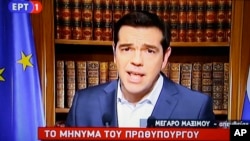Debt-ridden Greece offered concessions Wednesday on its creditors' demands for more austerity measures, but Prime Minister Alexis Tsipras still urged his nation to vote "no" in a referendum Sunday on the lenders' plan for new restrictions in exchange for more bailout loans.
European leaders contend that a Greek vote against the lenders' plan would amount to Athens withdrawing from the 19-nation euro currency bloc, but Tsipras rejected that argument.
"A 'no' vote is a decisive step for a better agreement, which we will aim to sign straight after the referendum," the prime minister said in a televised speech to his countrymen. " 'No' does not mean a rupture with Europe."
Watch related video report by Mil Arcega
Earlier, Tsipras told Greece's international creditors in a letter that Athens is prepared to accept most of Europe's terms for new bailout money. German Chancellor Angela Merkel rejected new negotiations, telling her country's parliament in Berlin, "We will wait for the referendum. There can be no negotiations on a new aid program before the referendum."
The Greek letter to creditors was shared with news outlets hours before a teleconference of eurozone finance ministers on Athens' request for $32.4 billion in new funding. After the meeting, however, the finance chiefs decided not to negotiate any more ahead of the Sunday vote.
US expresses concern
In Washington, President Barack Obama said Tuesday the Greek financial crisis is "an issue of substantial concern," but one that affects Europe more than the United States. Obama said the U.S. does not believe the ongoing financial turmoil will result in "a major shock" to the American economy, the world's largest.
U.S. Treasury Secretary Jack Lew, who spoke with several European finance ministers by telephone Tuesday, said afterward that it is in the best interests of all parties, and for the global economy, if Greece and its creditors continue to work toward a solution that puts Greece on a path toward reform and recovery within the eurozone.
Eurozone
The German leader, Europe's staunchest advocate for tough austerity measures in Greece, rejected the notion that the Greek financial turmoil would lead to the demise of the eurozone.
"The world is watching us," she said. "But the future of Europe is not at stake. The future of Europe would be at stake if we forgot who we are and what makes us strong — a community based on rules and responsibility."
Eurozone finance ministers had decided not to extend a bailout program for Greece on Tuesday, and the Greek government failed to make a $1.8 billion loan payment to the International Monetary Fund. That default marked the first time a developed country has failed to meet a payment deadline on an IMF loan.
The Fitch ratings agency Tuesday downgraded Greece's credit rating further into "junk" status, meaning it considers the country likely to default on private debt.
Debt burden
Greece has amassed a huge debt over the last five years. As a condition for new loans, lenders have insisted the government must introduce more austere economic reforms, but until now, the government has balked at such demands. Greece says its citizens have suffered enough with spending cuts and tax hikes that have lowered their standard of living.
Banks in Greece are closed this week as an emergency measure to control financial turmoil. Automated banking centers (ATMs) have continued operating, but with sharp restrictions on the amount of euros account-holders can withdraw. Authorities in Athens allowed about a thousand bank branches across the country to open Wednesday to serve pensioners who do not have ATM cards and need to withdraw cash.
It isn’t clear which way the voters will go in Sunday's referendum. Pollsters say Greeks are utterly confused. Some say a majority will reject the bailout deal, while others say more Greeks now favor the bailout after a week of economic disruption, with banks closed and capital controls imposed by Athens to halt capital flight. Polls show the “no” vote remains ahead, but that the gap is narrowing.
Left-wing parties and a militant bloc within the prime minister’s ruling Syriza party have reacted with fury at Tsipras’s latest offer, dubbing it a betrayal.
The country’s Communist Party has described the deal as “the worst bailout” ever and accused the prime minister of “shamefully fooling the Greek people.”
The anti-capitalist Antarsya bloc also issued a blistering attack, saying whatever it was called, the accord would further impoverish Greeks. "The negotiations of submission … have to stop now,” the far-left group said in a press statement. It added that the time had come for Greece to leave the European Union and write off all its debt.
Jamie Dettmer contributed to this report from Istanbul.










